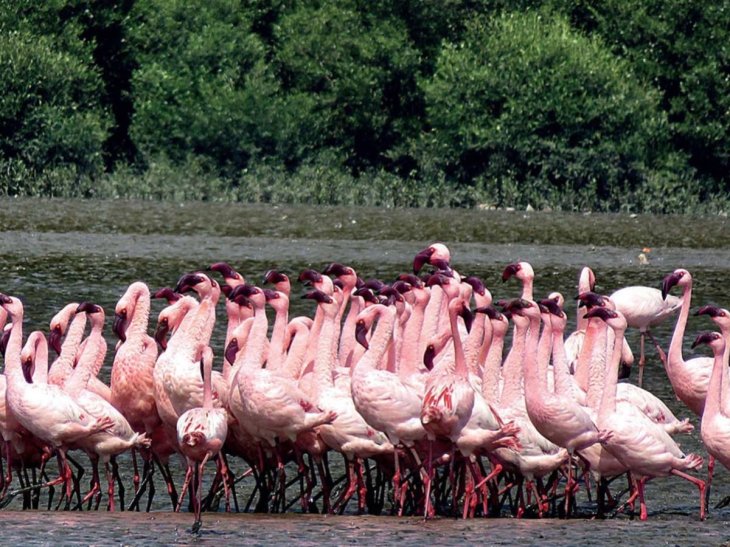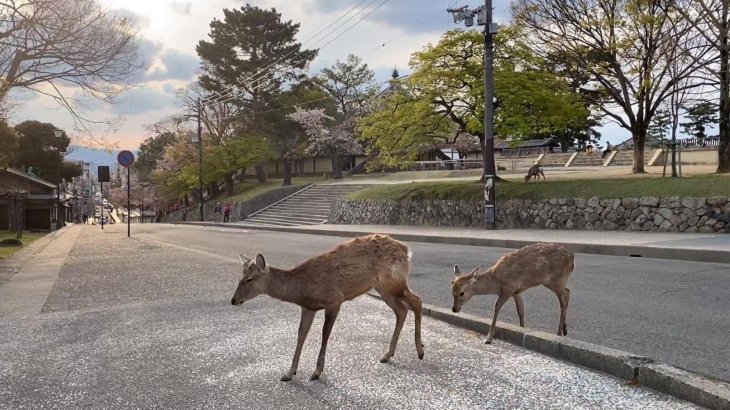The Ugly Truth Behind Animals Taking Over Cities While Humans Are In Lockdown
Aadhya Khatri - Apr 21, 2020

The truth behind the feel-good coverage of animals running wild in cities is neither simple nor positive
- This Man's Super-Antibody Can Be Diluted 10,000 Times But Still Works Against COVID-19
- These Indian Cities Are Under Lockdown Again In 2021
- India To Review Covishield Vaccine After Report Of Blood Clots Following Vaccination
You might have seen pictures of peacocks and most recently, flamingos taking over cities when India enters the lengthy mandatory lockdown to curb the spread of CO.VID-19.
Not just in India, other countries are seeing the same phenomenon with animals coming out of their hiding places when humans retreat to their homes. What we have are dear in Japan, goats in the UK, and wild boar in Spain.

In the last few weeks, feel-good coverage of animals running wild in cities was rampant on the Internet. Some say this is a good sign of natural healing, others just think it is cute or hilarious when they see so many animals in towns for the first time in their life.
However, the truth is not that simple nor positive. For the species that have grown too dependent on humans to feed them, the lockdown is a piece of bad news as now, there is no one there to feed them anymore.
For example, the deer in Japan are usually fed by tourists to Nara but ever since the outbreak, the lack of food from travelers has forced them to venture deeper to humans’ areas to find something to eat.
In France, pigeons are also fed by locals and tourists. And now when the social distancing order is in effect, they have no one there to feed them anymore. The same is true for monkeys in Thailand and seagulls in some port cities.
According to Menno Schilthuizen, professor and evolutionary biologist at the University of Leiden in the Netherlands, animals constantly monitoring us and where we live, waiting for a chance to take over once we are out of sight. Before the outbreak, excessive human presence might prevent them from doing so; but now, as we are indoors, they immediately take up where we left off.

Professor Schilthuizen focuses on how animals living in cities evolve and whether the process is different from that of their counterparts in nature.
He admitted that this outbreak had given researchers like him a unique opportunity for their study. However, he warned that whatever the effect, goof or bad will be reversed once the outbreak was over and we resumed with our normal activities.
Some of the most fearsome pandemics, including Ebola, HIV, and SARS, are from animals and then transmitted to humans. CO.VID-19 is just the same. It originates from bats, jumps to pangolins, and then infects humans.
This has made experts believe that the more we shrink wild animals’ habitats, the higher the risk of another pandemic.
Many people regard our current state as the rehearsal for how post-apocalyptic life is going to be in the near future if we fail to address climate issues right now.

Before another virus finds the chance to infect humans and cause another outbreak, humans have already had their hands full with catastrophic weather events, the backlashes of humans’ unsustainable activities.
It is unrealistic thinking that when we are at homes, nature just magically heals itself and wipe out all of the devastating effects we have imposed on it in the last few decades and then we can forget about climate change or animal extinction.
So the next time you see any feel-good videos or pictures of animals seemingly enjoying themselves in cities, feel free to admire the beauty but remember, behind that mesmerizing scene is the risk of another pandemic.
>>> Amid COVID-19 Pandemic, Navi Mumbai Residents Spot Flamingos From Their Houses
Featured Stories

Features - Jan 29, 2026
Permanently Deleting Your Instagram Account: A Complete Step-by-Step Tutorial

Features - Jul 01, 2025
What Are The Fastest Passenger Vehicles Ever Created?

Features - Jun 25, 2025
Japan Hydrogen Breakthrough: Scientists Crack the Clean Energy Code with...

ICT News - Jun 25, 2025
AI Intimidation Tactics: CEOs Turn Flawed Technology Into Employee Fear Machine

Review - Jun 25, 2025
Windows 11 Problems: Is Microsoft's "Best" OS Actually Getting Worse?

Features - Jun 22, 2025
Telegram Founder Pavel Durov Plans to Split $14 Billion Fortune Among 106 Children

ICT News - Jun 22, 2025
Neuralink Telepathy Chip Enables Quadriplegic Rob Greiner to Control Games with...

Features - Jun 21, 2025
This Over $100 Bottle Has Nothing But Fresh Air Inside

Features - Jun 18, 2025
Best Mobile VPN Apps for Gaming 2025: Complete Guide

Features - Jun 18, 2025
A Math Formula Tells Us How Long Everything Will Live
Read more

Gadgets- Feb 27, 2026
Top Budget-Friendly WiFi Routers for 2026
In today's connected world, a reliable WiFi router is essential for streaming, gaming, and working from home.

ICT News- Mar 01, 2026
Samsung Links Galaxy S26 Price Hikes to AI Memory Supply Issues
This development highlights the broader challenges faced by the tech industry as it integrates artificial intelligence into everyday consumer electronics.

ICT News- Feb 28, 2026
Anthropic Blacklisted by US Department of War: Trump Orders Federal Ban Over AI Safeguards Dispute
The story is developing. Federal agencies have been instructed to begin transition planning immediately.
Comments
Sort by Newest | Popular